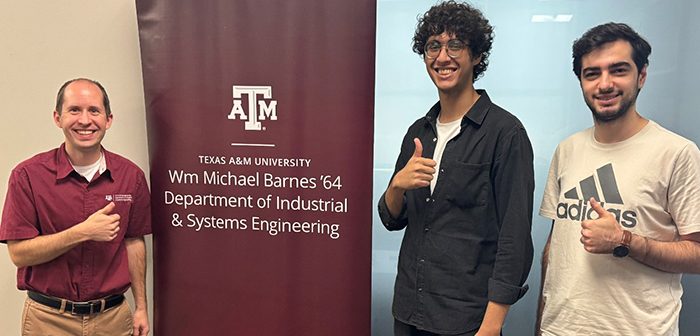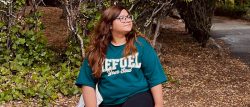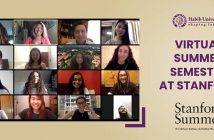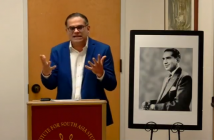From Shortlisting to a Surprising Match
My research abroad journey began in Fall last year when the applications for the program opened up. I knew from the start that I wanted to use this opportunity to work in theoretical computer science (TCS) and stated that motivation clearly in everything from my statement of purpose to my interview presentation. After being shortlisted by Habib, I was cautiously happy, knowing that there was still a chance I would not be matched with a professor at TAMU, and even if I was matched, funding would still be a significant hurdle.
As the weeks went by with no news of getting matched, expectations began to wither out and I was happy with getting far enough to be shortlisted. Then, out of nowhere, in early March, I received an email from TAMU that David Eckman, a Ph. D. in Operations Research, had expressed interest in having me work under him and wanted to have an online meeting. I was surprised: David was not on the list sent to TAMU of professors I wanted to get matched with because I had never even heard of the domain he worked in, which was ranking and selection (R&S) in stochastic simulations. I was hesitant about the whole thing, and even considered rejecting the invitation during or after the meeting because his domain and my interests seemed entirely disjoint. However, the meeting changed a lot.
Meeting My Mentor and Finding Common Ground
During the meeting, I found David to be an extremely humble and welcoming person. He admitted that his field and my interests were very different; however, he had found some work that was at the intersection of TCS and R&S and he discussed it with me during the meeting. He expressed that my profile stood out to him because of my interest in theory, and he figured that this work would suit me. He also stated that he did not want to impose any expectations of finding a new theorem or getting any publishable results onto me, and just viewed this as an opportunity for me to have the experience of coming to TAMU and doing theoretical research. His inviting demeanor really flipped a switch inside me and played the biggest role in motivating me to proceed with the program.
The Journey to Reaching Texas A&M
The next step was fundraising. Everybody that was shortlisted would have half of the program’s cost covered by HU. However, as I was the only one to be matched, HU covered 75% of the program’s cost for me. The rest of the amount was generously covered by Fahad Jalal, CEO of QLU.ai, who donated to my GoFundMe after I reached out to him. The rest of the process until reaching TAMU was mostly smooth, with some minor periods of uncertainty caused by escalating geopolitical conflicts.
Settling In: Kindness and Community at TAMU
Reaching TAMU was a milestone on its own. This was my first time traveling outside of my home city, and I was excited.
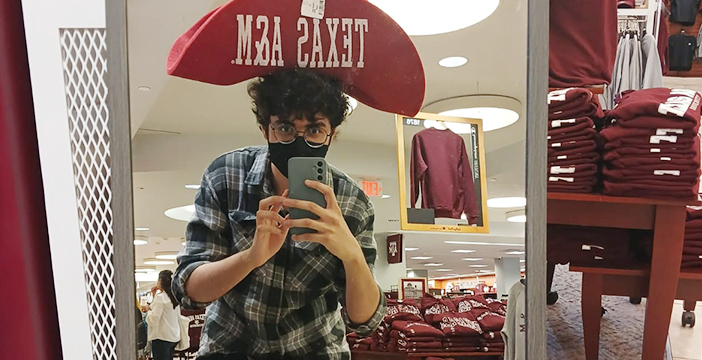
The people responsible for organizing the program at TAMU were very welcoming. On the first day, after everyone from different countries like Greece, Cyprus, and India had arrived, they took us to dinner at a Mexican restaurant right after they helped us do our initial grocery shopping. The next day, we were taken to a place called “The Closet”, which is a far too ominous name for what it actually is, which is a small room in an office building with things left behind by past students. We were allowed to take anything we wanted as long as we returned it before we left. There were pillows, baskets, cleaning supplies, and even electronics like electric kettles and rice cookers there for us to take, no questions asked – they trusted us. That day was where I first started understanding that this kind of generosity and trust is pretty integrated into the culture at TAMU. The day after I was shown my office, which is where I met Mohammed, a Ph. D. student under my supervisor, who had been assigned as a mentor to me. Mohammed took me to an Italian place nearby for lunch and then helped me with more grocery shopping. All these acts of kindness by all these different people really helped me settle into this unfamiliar place I was in.
Research and Collaboration in a New Field
My supervisor, David, was just as humble and warm in person as he was in the initial online meeting. I had to do a lot of reading in the first couple of weeks of my research and David’s advice and suggestions were really helpful. For a good part of the summer, I worked on finding equivalences between the methods adopted by the CS community and the simulation community for R&S. I was able to get an easier result pretty quick, but one of the harder cases is still unsolved. In the last few weeks of the summer, I explored a phenomenon that David and his co-author had observed in their work last year. We were able to come up with conjectures, backed by empirical tests, that proposed necessary and sufficient conditions for the phenomenon to arise.
My work with David is actually still ongoing, and will likely go on until we are able to formally prove our conjectures. Despite working in a field that I had not heard of before and was initially very hesitant to get into, I was able to get a lot of the experience that I was seeking with TCS research. Furthermore, working with David taught me a lot about how to go about solving unfamiliar problems, when to pull away after being stuck for a while, and when to push through when it looks like success is near. Looking back, I am very glad I had that initial online meeting with him.

Life Abroad: Independence, Routines, and New Experiences
Living alone was not as challenging as I had initially expected. I quite enjoyed the responsibility that came with it and was interested in optimizing my daily routine from the very start in terms of the time, energy, and money spent. I slowly learned the stores with the cheapest prices for flour tortillas, which became my “roti” while I lived there. I learned how to cook in a rice cooker so I didn’t need to rely on expensive microwaveable meals. I learned to not remain in my bubble and to socialize with all the students in my dorm. Every day, all of us would meet for dinner at around 6:30 PM at the dorm cafeteria where we would talk about our day, the work we’ve got going on, and any plans for the night or the weekend. The game nights we had are some of my favourite memories from my time there.
College Station, the city built around TAMU, is where most of my time was spent. Compared to Karachi, there’s very few tall buildings there, so the skyline was mostly clear. The sunsets were gorgeous and the greenery everywhere was comforting. The people were also very sweet. There was a lot more walking involved in my daily life than I was used to in Karachi, but I think it allowed me to take in the experience just as much more. The walk to and from the local Dollar Tree allowed me to think on my research, plan out the rest of my day, or just take my mind off of everything and relax. I visited an exotic pet shop, went to an ice skating rink (and struggled a LOT), attended a 4th of July house party, and tried out a bunch of different restaurants. I also got to visit San Antonio and some of the cultural sites there and even Six Flags! I had been hoping to visit a zoo since before I even booked my flight to Texas, and on the day before my return flight back home, I finally got a chance to spend a day at Dallas Zoo.
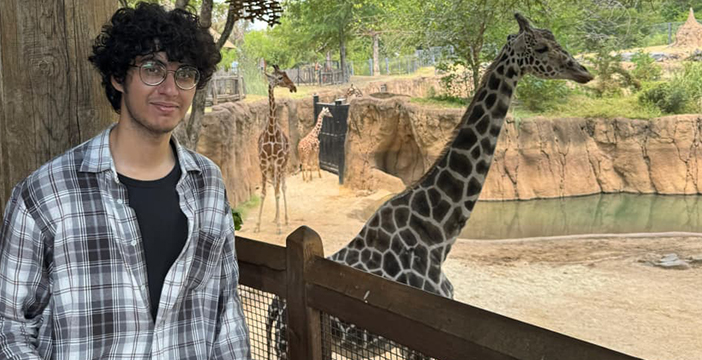
Lessons Learned and Words of Advice
This experience taught me a lot – definitely about my work, but also about myself. I could not have had the same experience, met the same people, and learned the same lessons if I hadn’t gone on a program like this. I feel very privileged to even be able to apply to such a program. To any other students who share my privilege and are on the fence about whether or not to apply: do it. Going through every stage of the experience is worthwhile, whether it be applying, fundraising, or actually going and doing the work. It may seem like there are too many question marks for it to be worth committing to something like this, but in my experience, the effort put in eventually pays off in ways you don’t expect.
Explore global research opportunities through Habib University’s Research Abroad program and take your academic journey beyond borders.
About the Author:
Raahim Hashmi

